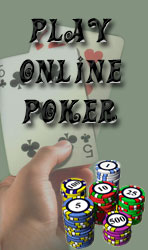Pokerwiner.com → Lessons of poker
BLUFFING AGAINST TWO OR MORE OPPONENTS
It is rarely correct to try to bluff out two or more people when all the cards are out; your chances of success decrease geometrically with each additional player in the pot.
Paradoxically you might have a profitable poker bluffing opportunity against each of two opponents individually, but not against both of them as a group.
Suppose, for example, you are heads-up on the end in a $10-$20 game. There is $80 in the pot, and you think you can get away with a bluff one of three times.
Clearly this is an extremely profitable bluffing situation. Once you will win $80, and twice you will lose $20 for a profit of $40 of an average profit of $13.33 per bet.
Now suppose you are in the identical situation except that you are up against two players instead of one. We’ll assume each player has put $40 in the pot to expand it to $120, and you think, as in the former case, that each opponent will fold on time out of three.
You are now getting 6-to-1 instead of 4-to-1 from the pot. Nevertheless, an attempt at a bluff is no longer profitable because the probability that both of your opponents will fold is ¹/³ X ¹/³, which equals 1/9.
In other words, eight times out of nine one or the other of your opponents will call on average. So you stand to lose $20 eight times for a total of $160 and to win $120 once.
Your net loss is $40 or $4.44 per bet.
Thus, opposing each individual player by himself results in a profitable bluffing situation, but if they’re both in against you, you have gone from a profitable situation to an unprofitable one.(It should be pointed out that I most bluffing situations against more than one player the probabilities that each player will fold are not independent. The player in the middle will frequently fold a hand that he would call with if he was last, and sometimes the player who is last will call with a hand he would have folded without hesitation had he been in the middle, expecting the player behind him to call. Nevertheless, the general principle still holds that it is usually more profitable to try to bluff one player out of a pot containing 2X dollars than to bluff two players out of a pot containing 3X dollars.)
BLUFFING AND BETTING FOR VALUE
The number of poker hands anyone can have is comparatively limited, but in addition to the hands themselves there are so many other variables that rarely if ever is particular play always right or always wrong.
Your play is affected you are facing, the way they have been playing, the amount of money they have and you have, the flow of the game, and other, more subtle factors.
This point is particularly applicable to questions of bluffing and betting fair hands for value on the end. Here are some general principle that usually apply.
When you bluff, you are rooting for your opponent to fold because that is the only way you can win the pot.
When you bet for value, you are rooting for your opponent to call because you want your legitimate hand to win one more bet from him.
It is important to realize that it may be right to bet a fair hand for value, and it may also be right to bluff, but it is almost never right to do neither.
If you decide you can’t get away with a bluff on the end when you miss your hand, then you should bet for value when you do make your hand. (The only exception to this principle would occur in games like holdem and five-card stud, where your opponent can see your last card and might often have a good sense of whether it made your hand. In those cases, if you bet a hand for value, you are likely to get called or raised only by a hand that has you beat.)
Similarly, when you don’t think a value bet is justified with a fair hand, since your opponent will only call if he has you beat, then if you miss your hand, you should usually bluff.
For when you bluff, it is possible your opponent will throw away his fair hands.



